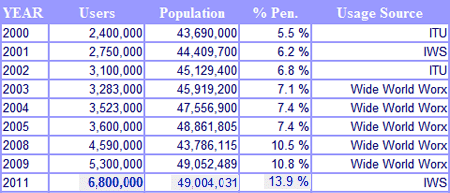If internet access is a basic human right, as a recent UN report suggests, South Africa is a long way from implementing it
 A UN report released in June 2011 suggests that internet access ought to be an essential right for all citizens. The report connects internet access with freedom of expression, a right guaranteed in article 19 of the International Covenant on Civil and Political Rights, and calls upon governments to develop an effective plan of action to make the internet widely available, accessible and affordable to all segments of the population.
A UN report released in June 2011 suggests that internet access ought to be an essential right for all citizens. The report connects internet access with freedom of expression, a right guaranteed in article 19 of the International Covenant on Civil and Political Rights, and calls upon governments to develop an effective plan of action to make the internet widely available, accessible and affordable to all segments of the population.
South Africa still has a long way to go when it comes to making the internet “widely available and affordable”. Some sources estimate the current internet penetration at 11 percent, which is the average for the African continent and well below the world average of 30 percent. The latest report by the Internet World Stats mentions higher, but still paltry figures: 6.8 million users, or 13.9 percent of the population.
Different sources put the number of South Africans who have access to the internet at five, six or almost seven million. Low as any of those figures are in themselves, it should be noted that very few South Africans are connected from home. The majority browse internet only at their place of work. Analysts say that in South Africa the web traffic halves by about 5 PM, as offices tend to close for the day.
The South African Department of Communications puts the broadband penetration at home at the very modest five percent of the population, citing the high cost of services and limited access to broadband in rural areas as reasons.
Worse still, the Department expects the rate of expansion of the internet to slow down by 2015, from about 15 percent to only 10 percent a year. This would mean that by 2015 there would be about 11.3 million of internet users, or approximately (only) 22 percent of the population.
South African internet service providers put the blame squarely on the government’s shoulders. They say that, while all parties pay lip service to the concept of affordable internet access for all, true political will, such as has been displayed in connection with the 2010 FIFA World Cup, is lacking. As a result, the internet remains unaffordable and mysterious for the majority of South Africans.
True, mobile communications continue to experience unprecedented growth in the country, and many cell phones are internet-enabled. Some studies put the number of South Africans with internet access on their phones at (probably conservative) six million. Good as this news is, it is but a consolation prize. Cell phones and smart phones are good enough for receiving (and possibly reacting to) marketing messages, for sending or reading email messages, downloading a few songs or games, or even for some quick online shopping. And that’s about it. The whole vast areas of the more challenging endeavours that really make the World Wide Web worthwhile, like serious research or conducting an online business, remain out of reach of cell phone-connected users. Some things are, after all, not only better on the big screen – they are only available on the big screen.
 | ||
 | ||
| Internet penetration: 2011 estimates | The history of internet penetration in South Africa | |
|  | |